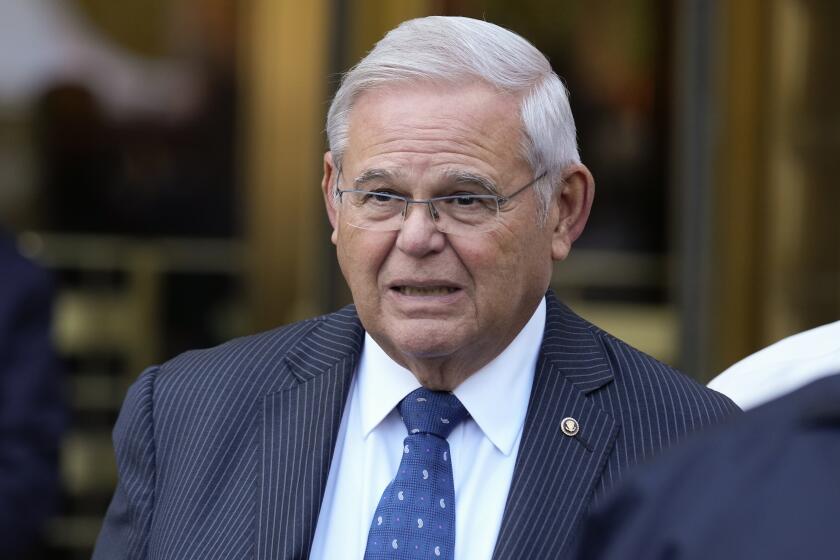Israeli Walkout at Talks Averted
Israeli Prime Minister Benjamin Netanyahu backed down late Wednesday from a threat to walk out of the Wye Plantation peace summit, agreeing to continue the talks in an effort to wrest additional security assurances from the Palestinians.
“The prime minister of Israel has instructed his delegation to continue the talks with the hope of achieving an agreement,” said David Bar-Illan, a senior advisor to Netanyahu. “Israel wishes to achieve an agreement and hopes there is similar desire on the Palestinian side.”
The decision to continue the summit ended a daylong crisis that was touched off when Israel vowed to go home unless the Palestinians made concessions on extradition of accused terrorists and on revisions of the Palestinian charter, along with other security issues.
State Department spokesman James P. Rubin said that U.S., Israeli and Palestinian security officials planned to meet throughout the night in an effort to resolve the points of contention.
Palestinian officials said the security accord was complete, but Israeli sources contradicted that.
“We’re in it for the night,” Rubin said.
Late Wednesday, CIA Director George J. Tenet, Israeli Defense Minister Yitzhak Mordechai and Palestinian security officials held a meeting that Israeli sources said seemed to break the impasse.
However, a U.S. official said there was no breakthrough on security issues as a result of that meeting.
He said the Israelis decided to continue the talks when they realized the United States would not wrest additional concessions from the Palestinians.
President Clinton, who has invested more than 55 hours in the summit since it began last Thursday, spent the day away from the Chesapeake Bay compound.
Rubin said that Secretary of State Madeleine Albright will brief Clinton on the talks this morning and that the president will decide then whether enough progress is possible to justify his return to the table.
Rubin said Albright met twice with Netanyahu and talked to him several times by phone before the Israelis decided to remain in the talks.
Shortly before midnight, she began a session with Palestinian Authority President Yasser Arafat.
Rubin said that “before sunrise” the United States will have given both sides a U.S.-drafted paper of less than 20 pages reflecting issues already agreed upon by Netanyahu and Arafat and offering U.S. proposals to resolve remaining issues.
He expressed optimism that the summit will wrap up today, although he said “significant work remains to be done” on virtually all of the security and territory issues that are at stake.
“The handing over of the text is another phase in the process,” Rubin said.
Rubin announced earlier in the day that the United States had prepared a U.S. text. However, the paper was not circulated in full until late Wednesday night.
Wednesday afternoon, Netanyahu’s office issued a blunt statement: The prime minister had informed Albright “that without fulfillment of Palestinian obligations, including the transfer of wanted terrorists and the revision of the Palestinian Covenant which calls for the destruction of Israel, there can be no agreement. The prime minister and the Israeli delegation have packed their bags, and some of the luggage has been transferred to the airport.”
He set a deadline of 10 p.m. EDT for his departure.
Netanyahu also sought to bolster his U.S. political support, explaining his position in the negotiations to American Jewish leaders in a telephone conference call.
A source familiar with the call said Netanyahu argued that the Palestinians were solely to blame for the impasse.
Rubin said the furor over the threatened Israeli walkout was an unwelcome distraction that was finally overcome.
He said all sides will try “to keep our focus on the substance needed for progress.”
The issues that the Israelis cited as deal breakers have been part of the Middle East negotiations for months, but they had receded into the background during the first six days of the Wye Plantation talks. It was not clear why the Israelis chose to emphasize them Wednesday.
Israel wants the Palestinian Authority to agree to extradite to Israel Palestinians accused of terrorism.
Arafat has promised to punish terrorists by incarcerating them in Palestinian jails, and he has offered to allow the CIA to verify that they are treated as criminals.
Israel is also demanding that Arafat summon the Palestine National Council, the parliament in exile of the Palestine Liberation Organization, to repeal articles of the PLO’s charter calling for the destruction of Israel.
Several years ago, the council voted to eliminate all articles deemed “incompatible” with Israeli-Palestinian peace. Arafat gave Clinton a letter earlier this year certifying that the anti-Israel articles were null and void.
Netanyahu wants the council to repeal the articles line by line. Arafat is reluctant to call the council into session because its deliberations could not be limited to the charter, and its political impact is unpredictable.
The Palestinians accused Israel of making new demands after their earlier proposals had been accepted.
“A new demand will not be accepted,” said Ahmad Tibi, a senior advisor to Arafat. “We understand these new demands are a pretext in order to bring the negotiations to failure. The threat of a walkout is being employed by them as a political game. I hope they will not leave the talks. We are here in order to achieve an agreement.”
Tibi said the Palestinians accept the U.S. proposals without change. However, Rubin seemed reluctant to take the Palestinians’ “yes” for an answer.
“If one side or the other is saying, before fully absorbing it, they’re going to accept it in full, that would surprise me,” Rubin said. “It would suggest to me that they’re making a larger point rather than a specific point.”
Each side accused the other of threatening to break up the talks.
“It is simple and sad because we came here to reach an agreement,” said Netanyahu’s spokesman, Aviv Bushinsky. “We find that the Palestinians are not only unwilling to fulfill their obligations, but they also went backward. There is a deterioration in the situation.”
The Israeli and Palestinian leaderships face trouble at home whatever kind of deal they may reach.
Protesters took to the streets of Israel, the West Bank and the Gaza Strip on Wednesday after reports of a possible deal filtered back to the Mideast.
Draped in white prayer shawls and waving Israeli flags, Jewish settlers from the occupied West Bank held a vigil on the road between the Palestinian-controlled cities of Ramallah and Nablus. Police did not intervene, and mostly Palestinian traffic was forced to divert through surrounding Arab villages.
The settlers vehemently oppose ceding any land to the Palestinians. They launched what they called a massive campaign of civil disobedience to pressure Netanyahu not to sign an agreement.
“This is a battle over our home,” settler Meir Gross said. “This is the home of the entire people of Israel. We are in a war over our existence.”
Also responding to reports of concessions to the Palestinians, right-wing members of Netanyahu’s ruling political coalition accused him of “selling out” and renewed threats to overthrow the prime minister if he concedes more in the talks than these politicians will countenance.
“Bibi [Netanyahu] has gone to gamble in Arafat’s casino,” said Benny Begin, a Knesset member from Netanyahu’s Likud Party. “He is gambling with the existential issues of the state of Israel. . . . Such a government has no right to exist and must be brought down.”
The right announced that it will sponsor a no-confidence motion in the Israeli parliament Monday.
In the Gaza Strip, meanwhile, the families of Palestinian prisoners held in Israeli jails also demonstrated, lying across roads leading to Jewish settlements to demand freedom for their relatives.
Times Jerusalem Bureau Chief Tracy Wilkinson contributed to this report.
More to Read
Start your day right
Sign up for Essential California for news, features and recommendations from the L.A. Times and beyond in your inbox six days a week.
You may occasionally receive promotional content from the Los Angeles Times.






